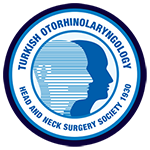ABSTRACT
Objectives:
The time to begin oral feeding after total laryngectomy remains a subject of debate among head and neck surgeons. Widely accepted consideration about this subject is early feeding may facilitate the development of pharyngocutaneous fistulae.
Methods:
68 patients who had been totally laryngectomized between January 1, 1998 and December 31, 2002 in SSK Tepecik Training Hospital, ENT - Head and Neck Surgery Clinic were included in this study. Patients were divided into two groups as control and study. 36 patients who had been totally laryngectomized between January 1998 and June 2001 formed the control group, who were orally fed 7 to 10 days after total laryngectomy. 32 patients consisted the study group that underwent total laryngectomy between August 2001 and December 2002. The oral feeding of this group began between the 24th and 72nd postoperative hours (average 2.1 days).
Results:
The developmental and the predispositional factors of the fistulae were evaluated. Pharyngocutaneous fistulae ratio was found to be 9.4% for the early feeding group (24 to 72 hours) and 13.9% for the late feeding group (7 to 10 days). The mean time for fistula to be formed was considered to be 7 days for the early feeding group and 10 days for the late feeding group. Hospitalization period of the patients without fistulae after the operation was found to be 9 days for early feeding group and 11.5 days for the late feeding group.
Conclusion:
The difference between these two groups is not statistically significant (p>0.05).
ÖZET
Amaç:
Total larenjektomi sonrası ağızdan beslenmeye başlama zamanı, günümüzde tartışma konusu olan bir durumdur. Bu konudaki yaygın düşünce ağızdan erken beslenmenin farengokutanöz fistül gelişimini kolaylaştırabileceği şeklindedir.
Yöntem:
Tepecik SSK Eğitim Hastanesi Kulak Burun Boğaz ve Baş Boyun Cerrahisi Kliniği'nde 1.1.1998-31.10.2002 tarihleri arasında total larenjektomi yapılan 68 hasta çalışmaya alınmıştır. Hastalar kontrol grubu ve çalışma grubu olmak üzere ikiye ayrılmıştır. Kontrol grubunu, Ocak 1998 - Haziran 2001 tarihleri arasında total larenjektomi yapılan 36 hasta oluşturmuştur. Bunlar ameliyat sonrası 7-10 günler (ortalama 7.4 gün) arasında ağızdan beslenmiştir. Çalışma grubunu Ağustos 20001- Aralık 2002 tarihleri arasında total larenjektomi yapılan 32 hastada oluşturmuştur. Bu grup 24-72 saat sonra (ortalama 2.1 gün) ağızdan beslenmeye başlanmıştır.
Bulgular:
Hastalarda farengokutanöz fistül gelişip gelişmediği ve fistül oluşumuna predispozan diğer faktörler de incelenmiştir. Total larenjektomi sonrası farengokutanöz fistül oranı ağızdan erken (2472 saat) beslenen çalışma grubunda %9.4 ve ağızdan geç (7-10 gün) beslenenlerde %13.9 bulunmuştur. Fistülün ortaya çıkış süresi ortalaması ağızdan erken beslenen grupta 7. gün ve ağızdan geç beslenen grupta 10. gün olarak belirlenmiştir. Hastanede kalış süreleri; fistül gelişmeyen hastalarda ağızdan erken beslenen grupta ortalama 9 gün, ağızdan geç beslenen grupta ise ortalama 11.5 gün olarak saptanmıştır.
Sonuç:
İki grup arasındaki fark istatistiksel olarak anlamlı bulunmamıştır (p>0.05).



